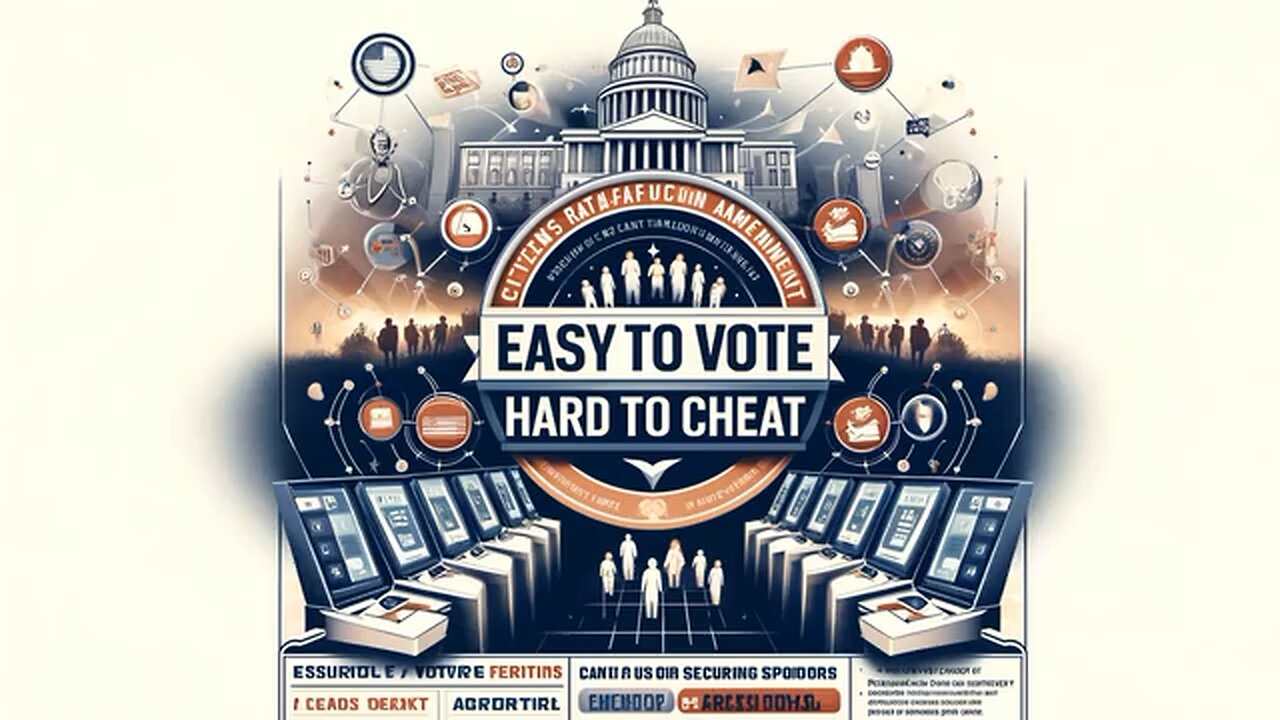Premium Only Content

Perhaps you thought the CRA has not been considered to the last detail? The CRA meticulously empowers citizens to ratify or unratify statutory laws, maintaining a non-partisan framework. CRI operates as a fully volunteer-run organization with minimal overhead. The CRB portal provides extensive educational resources, ensuring informed citizen participation. With a detailed implementation timeline, advanced security measures, and ongoing impact assessment, the CRA upholds constitutional integrity while allowing the legislative framework to evolve based on citizens' needs. This comprehensive approach demonstrates the CRA's careful and thorough planning.
These laws derive their authority from specific constitutional provisions and amendments, ensuring they align with the fundamental principles and rights established by the Constitution. There are thousands of laws under these categories, and all these principles are safe from unratification.
1. **Civil Rights Laws**: Enforce equal protection and non-discrimination (14th Amendment).
2. **Voting Rights Acts**: Ensure the right to vote and prevent discrimination (15th, 19th, 24th, and 26th Amendments).
3. **Freedom of Speech Laws**: Protect freedom of speech and expression (1st Amendment).
4. **Freedom of Religion Laws**: Protect religious practices and prevent the establishment of religion (1st Amendment).
5. **Due Process Laws**: Ensure fair legal proceedings and protect against arbitrary government actions (5th and 14th Amendments).
6. **Right to Privacy Laws**: Protect against unwarranted searches and seizures (4th Amendment).
7. **Gun Control Laws**: Regulate the ownership and use of firearms (2nd Amendment).
8. **Anti-Discrimination Laws**: Prohibit discrimination based on race, gender, and other protected classes (14th Amendment).
9. **Criminal Procedure Laws**: Protect the rights of the accused, including the right to a fair trial and protection against self-incrimination (5th, 6th, and 8th Amendments).
10. **Property Rights Laws**: Protect against the unlawful taking of private property without just compensation (5th Amendment).
11. **Labor Rights Laws**: Protect the rights of workers, including minimum wage and safe working conditions (Commerce Clause, 14th Amendment).
12. **Interstate Commerce Laws**: Regulate trade and commerce between states (Commerce Clause).
13. **Education Rights Laws**: Ensure equal access to education and prohibit segregation (14th Amendment).
14. **Immigration Laws**: Regulate the entry and status of non-citizens (Article I, Section 8).
15. **Bankruptcy Laws**: Provide uniform laws on bankruptcy (Article I, Section 8).
16. **Patent and Copyright Laws**: Protect intellectual property (Article I, Section 8).
17. **Environmental Protection Laws**: Regulate activities affecting interstate commerce and public health (Commerce Clause).
18. **Health Care Laws**: Regulate health insurance and public health standards (Commerce Clause, 14th Amendment).
19. **Family Law**: Ensure protections in marriage, divorce, and child custody cases (14th Amendment).
These laws are created by legislative bodies and are necessary for the regulation and order of various aspects of daily life, even though they are not directly derived from constitutional provisions. Thousands of laws fall under these categories, and none are enforceable if unratified.
1. **Traffic Regulations**: Speed limits, parking rules, vehicle registration.
2. **Zoning Laws**: Land use restrictions, residential vs. commercial zoning.
3. **Business Licensing Requirements**: Permits for operating businesses.
4. **Environmental Regulations**: Pollution control, waste management.
5. **Building Codes**: Safety standards for construction.
6. **Public Health Ordinances**: Sanitation, vaccination mandates.
7. **Local Tax Laws**: Property taxes, sales taxes.
8. **Employment Standards**: Minimum wage, workplace safety.
9. **Consumer Protection Laws**: Product safety, fraud...
-
 1:13:08
1:13:08
MTNTOUGH Fitness Lab
21 hours agoJim Burgen: The Hard Truth About Leading Men | MTNPOD#113
22.2K3 -
 37:59
37:59
BibleUnbound
19 hours agoThe Complete Story of John: The Apostle | How to Love Like Christ
12.2K7 -
 56:22
56:22
Vedic compatability astrology
14 hours ago"From Death to Divine: My Awakening, Healing & Soul Path Revealed"
14.9K1 -
 8:54
8:54
VSOGunChannel
14 hours ago $2.96 earnedBREAKING: Anti Gun Activist Megan Bennett Removed from ATF
48.7K16 -
 12:38
12:38
China Uncensored
16 hours agoTaiwan is DONE With China
34.3K47 -
 22:03
22:03
SantaSurfing
13 hours ago4/21/2025 - Pope is gone! How the world is changing for the good! Trump bring religion back!
37.5K36 -
 1:01:30
1:01:30
Trumpet Daily
20 hours ago $8.64 earnedEurope’s Religious Revival - Trumpet Daily | Apr. 21. 2025
37K6 -
 34:52
34:52
Steph & Kayls
16 hours ago $1.34 earnedToys In The Bedroom: Fun, Fantasy, or Too Far? | Ep. 3
18.6K6 -
 2:03:22
2:03:22
Badlands Media
18 hours agoBaseless Conspiracies Ep. 129: Vatican Black Ops, Red Shoes, and the Financial Empire of the Popes
189K55 -
 2:39:38
2:39:38
TimcastIRL
12 hours agoMS-13 Story BURNS Democrats, Media PANICS Tries To Get Off Immigration Story | Timcast IRL
252K1.11K